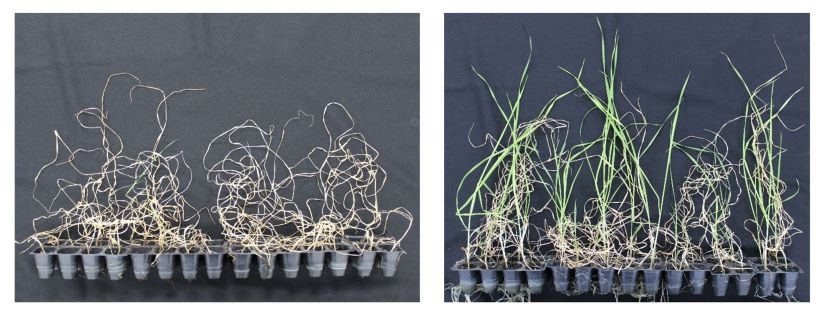(CN) — Increased temperatures and water scarcity due to climate change have raised fears of food shortages as droughts affect crop production worldwide. One way scientists have been looking to sustain crop yield is to develop more robust plants to withstand prolonged drought.
Although some have focused on genetic modification to accomplish this, researchers with Japan’s RIKEN Center for Sustainable Resource Science have developed a simple, cost-effective ethanol soil treatment that could help crops thrive even throughout periods of drought. They published their findings Wednesday in the journal Plant and Cell Physiology.
“The discovery came from the process of searching for compounds that make plants resistant to stress,” said Motoaki Seki, co-author of the study and leader of RIKEN’s Plant Genomic Research Team, in an email interview. “In general, experiments on compounds use organic solvents such as ethanol, acetone and methanol to dissolve insoluble substances. Our experiment used several kinds of organic solvents and obtained data that made us suspect that the organic solvents, not the compounds, could have a property that makes plants stress resistant.”
Researchers emphasize their method is merely an extension of the plants’ naturally occurring processes. This technique of ethanol application does not rely on controversial genetic modification and is both economically and environmentally friendly. As a naturally occurring compound, ethanol can eliminate fears of dangerous chemically treated food. But although safe for consumption, researchers have other concerns.
“Higher concentration of ethanol inhibits plant growth,” Seki acknowledged. “So, optimization of ethanol treatment (concentration and treatment period etc.) is important.”
Seki's team found the optimized application of ethanol to the soil boosts drought tolerance in rice, wheat, and Arabidopsis thaliana, a plant commonly used in biological plant research.
They conducted an experiment where plants, after several weeks of normal watering, were suddenly deprived of water. Some of these plants had had their soil pretreated with ethanol, and by the next week, there was a marked difference between treated and non-treated plants. Plants growing in the regular soil had withered and died, but 75% of the ethanol-treated plants survived — and even thrived — after rewatering.

Seki and his team found the ethanol not only helped plants to retain water, but also triggered genes usually associated with drought tolerance even before the plants were deprived of water.
According to the study, ethanol specifically affected the plants’ stomata — pores on the leaves where carbon dioxide enters the plant and water vapor and oxygen exit. Ethanol caused the stomata to close, thereby trapping more water in their leaves than the untreated plants.
In the experiment, plants received the ethanol application several days before the team stopped watering. While analyzing the gene expression of the plants, researchers noticed that the genes normally seen with water deprivation was expressed even before the researchers paused in their watering, indicating that the ethanol may have given the plants a head start in preparing for water withdrawal.
During this same time, the ethanol prompted the plants to create more sugars and engage in photosynthesis, further helping the plant stay alive. Seki highlighted how the process might have advantages beyond keeping the plant alive through drought.
“As ethanol treatment shows the increased accumulation of several sugars, amino acids and glucosinolates, we hope that this would be beneficial effects for humans,” he said.
Even without the added sugars, the potential crop growth generated by ethanol soil treatments could help solve food crises by counteracting water scarcity, the researchers hope.
Subscribe to Closing Arguments
Sign up for new weekly newsletter Closing Arguments to get the latest about ongoing trials, major litigation and hot cases and rulings in courthouses around the U.S. and the world.









